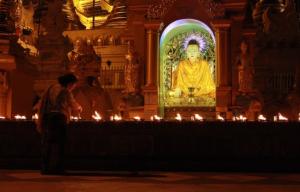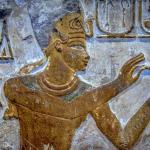
Image via Julie Ricard / Unsplash
Healing from something traumatic doesn’t happen overnight. It can take years even to accept the traumatic event occurred. When people are ready to process and move forward from their trauma, they may turn to religion or philosophy to help them. You’re not alone if you’re curious about delving into Buddhism while healing trauma.
What Is Trauma?
Trauma is an event of physical or emotional scarring that elicits a response long after the instance has passed. For example, someone could experience trauma when they get into a severe car accident, are a witness to a crime or are the victim of abuse. However, it’s more than going through something scary — the brain rewires when you have trauma, and can result in lasting bodily or psychological responses.
What Do Buddhists Believe?
Buddhism has been around for thousands of years. People call it either a religion or a spiritual practice, although there is no centralized god. It’s why 42% of Buddhists don’t believe in or feel sure about the existence of a god. Instead, followers practice the core beliefs founded by Siddhartha Gotama, known as the Buddha.
Those beliefs are in the Buddhist doctrine called the Dharma. Believers follow it as the universal truth that points the way toward enlightenment. When broken down, the Dharma contains four noble truths:
- Noble Truth 1: Life inherently includes suffering, both mental and physical.
- Noble Truth 2: Expectations, cravings and aversions cause your suffering.
- Noble Truth 3: It is always possible to overcome suffering and achieve happiness.
- Noble Truth 4: The Eight-Fold Path is the way to end suffering.
Believers follow the Eight-Fold Path to heal the inner self and remain steadfast during times of trial. The steps include:
- Right View: Acknowledging the four Noble Truths
- Right Resolve: Committing to ending suffering for yourself and others
- Right Speech: Abstaining from negative, mean or idle speech
- Right Action: Doing only what helps yourself or others
- Right Livelihood: Taking only what you need and supporting yourself on ethical work
- Right Effort: Cultivating only good inner qualities and outward actions
- Right Mindfulness: Becoming mindful of how the world affects your body, emotions and consciousness or vice versa
- Right Concentration: Meditating with complete focus to remain stable on the path to improved thoughts and actions
Practicing or understanding each step confidently may take more than one lifetime. Buddhists also believe in reincarnation based on the actions in your previous life.
What Does Buddhism Say About Trauma?
There are numerous ways people take a trauma-informed approach to Buddhism. These are the most crucial elements to remember while considering a Buddhist perspective on healing trauma.
Trauma Is an Unavoidable Part of Life
Buddhists take a realistic view of suffering — they acknowledge it’s an unavoidable part of being alive. Instead of becoming pessimistic about it, the religion encourages followers to utilize the Eight-Fold Path to reduce suffering around them.
Trauma would fall under the category of human suffering. Acknowledging it is the first step to recovery because you can find more effective solutions when you can identify your pain.
This part of Buddhism can also help people release the personal responsibility they feel for their trauma, even when it happened at someone else’s hands. If you believe your suffering was unavoidable, there’s no reason to continue believing it happened due to a personal fault or mistake.
Karma Holds People Accountable
Buddhists hold a central belief karma is a law of moral retribution. The rule of karma is that everyone bears the consequences of their good or bad actions. Trauma survivors may begin healing based on this premise if their perpetrator didn’t face legal or interpersonal consequences for inflicting harm. Karma ensures the repercussions will happen eventually, even in their next life.
Communities Should Help Each Other Heal
When trauma survivors come forward with their experiences, people may blame them for that event or make them feel ashamed in other ways. This goes against the Buddhist practices of Right Speech and Right Action. Instead, Buddhist communities help each other heal by focusing on what trauma survivors need to recover.
The support prevents trauma survivors from feeling isolated as well. They feel loved and free to access the spiritual and professional support required to heal, like therapy. It’s why Buddhism and complex PTSD treatments often work well together. When a therapist helps their client relax their muscles with water exercises or eye-movement desensitization and reprocessing sessions, they provide essential support that aligns with Buddhist beliefs.
How to Use Buddism to Heal from Trauma
Learning about Buddhist teachings is one way to heal from trauma. You can also use these practices to make positive steps forward.
Try Meditating
People sometimes think meditating requires a paid instructor or years of experience, but anyone can try it. All you have to do is focus on your slow breathing for at least 30 seconds. Reflect on your emotional and physical sensations as you feel each inhale and exhale.
If you’re sad, ask why that sadness is present. If you’re feeling panic in your chest, sit with that sensation until a connecting emotion or thought makes itself known.
You can do this anywhere, although it might be easier in a quiet environment with closed eyes. Meditation can heal trauma and even reroute intrusive thought patterns with enough practice. The key is recognizing your emotions or sensations to spend time with them. It’s how you can unbox compartmentalized memories and process them.
Connect With a Therapist
The foundational Buddhist beliefs are an excellent place to ground yourself when you’re ready to heal from trauma. However, it’s not an exact replacement for psychotherapy. Build a supportive community like Buddhism recommends by attending sessions with a therapist specializing in your specific type of trauma.
You could combine your newfound Buddhism and complex PTSD treatments to make peace with your past faster. While Buddhism informs your new perspective, your therapy could rewire your nervous system from a scientific approach. Both practices would come from a place of self-care to ease your suffering.
Commit to Radical Self-Compassion
Buddhists believe in appreciating what they have and where they are so they avoid suffering that stems from craving more. You can’t authentically support yourself in your healing journey without radical self-compassion.
Can meditation heal trauma? Try working it into your daily routine, like once in the morning and once at night. Recognize what you’re feeling, even if it hurts. Celebrate how far you’ve come. Find gratitude in your progress. Meditation can ease trauma and its lingering effects if you retain compassion for your whole self.
What Buddhism Says About Healing Trauma
It’s possible to gain a Buddhist perspective when healing from trauma once you’ve read about the religion’s core beliefs. Using it as a resource may help recover from conditions like complex PTSD and other forms of trauma because it prioritizes inner needs, encourages communal connections and fosters greater happiness through concrete steps.













